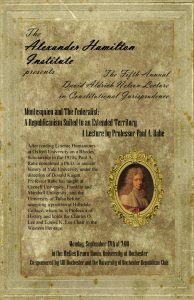On September 16, the Alexander Hamilton Institute for the Study of Western Civilization (AHI) held a “Leadership Dinner” for Paul Rahe, Charles O. Lee and Louise K. Lee Chair in Western Heritage and Professor of History at Hillsdale College. Guests– students, faculty, and informed citizens—prepared for an intensive evening of conversation by reading Professor Rahe’s essay “Between Trust and Distrust: The Federalist and the Emergence of Modern Republican Constitutionalism.” On Monday, September 17 (Constitution Day), Professor Rahe marked the fifth anniversary of the creation of the AHI by traveling to the University of Rochester to speak on “Montesquieu and The Federalist: A Republicanism Suited to an Extended Territory” before a sizeable audience composed primarily of undergraduates associated with Professor Mike Rizzo’s AHI Rochester.
Few scholars know more about the origins of that great experiment in republican government than Professor Rahe. A classicist who received his PhD at Yale University under the direction of Donald Kagan, Professor Rahe translated his dissertation into a prize-winning book of more than 1200 pages in which he did nothing less than trace the history of the origin and meaning of republicanism from antiquity to modernity. He followed this considerable achievement with a deeply learned trilogy: Against Throne and Altar: Machiavelli and Political Theory Under the English Republic (Cambridge University Press, 2009); Soft Despotism, Democracy’s Drift: Montesquieu, Rousseau, Tocqueville, and the Modern Prospect (Yale University Press, 2010); and Montesquieu and the Logic of Liberty: War, Religion, Commerce, Climate, Terrain, Technology, Uneasiness of Mind, the Spirit of Political Vigilance, and the Foundations of the Modern Republic (Yale University Press, 2010).
Professor Rahe’s essay on ancient and modern constitutionalism focused on the nature of the new secular order created by the founders and the disparate materials that went into the making of the United States Constitution. “To the best of my knowledge,” Rahe began, “liberty first became a critical feature of constitutionalism in classical Greece.” When the Greeks thought of the maintenance of the constitution of liberty, they concentrated on character, the cultivation and nurturing of the virtuous citizen. Modern constitutionalism, in contrast, focused on institutions and certain assumptions, most notably associated with the writings of Machiavelli and Hobbes, about self-interested human beings ruled by passion. Professor Rahe contended that the founders accepted many of the assumptions of modern constitutionalism, as evidenced by the attention to structures in the Constitution, but they also accepted ancient formulations in that they believed a properly structured republic would facilitate the triumph of reason over passion in the conduct of political affairs.
On Constitution Day, in the Welles Brown Room of the University of Rochester’s Rush Rhees Library, Professor Rahe delivered the Fifth Annual David Aldrich Nelson Lecture in Constitutional Jurisprudence on the impact of Charles-Louis de Secondat, baron de la Brède et de Montesquieu in the framing of the Constitution. Montesquieu, as Professor Rahe pointed out, strode the political thinking of the eighteenth-century transatlantic political world like a colossus. His De l’esprit des lois (Spirit of the Laws; 1748) was “a publishing phenomenon,” translated into multiple languages, and read by “learned men and would-be statesmen everywhere in Europe and beyond.” The name of no political thinker appears more prominently in The Federalist. Anti-Federalists cited Montesquieu approvingly in asserting that the United States could not survive as an extended republic, that the folkways needed to sustain republicanism could only be generated by a tightly-knit political community within a small territory. Federalists responded to the authority of Montesquieu on the nature of republics by advancing a new conception of federalism that brought a community of republics together in a peculiar power-sharing arrangement that James Madison called divided sovereignty. Over time, however, Madison became uneasy about the possibility of federal encroachment on the “the prerogatives of the states and the localities.”
Professor Rahe’s stimulating lecture generated a question-and-answer period that lasted almost an hour. The AHI thanks Professor Rahe for helping the AHI celebrate its fifth anniversary and Professor Mike Rizzo for organizing the event in Rochester. On Constitution Day, 2013, Professor Keith E. Whittington, William Nelson Cromwell Professor of Politics at Princeton University, will deliver the Sixth Annual David Aldrich Nelson lecture at Texas A&M University.


Leave A Comment